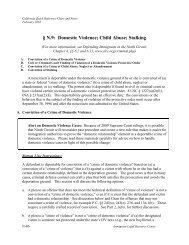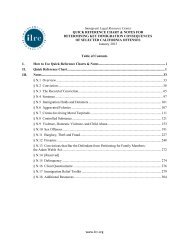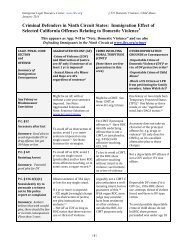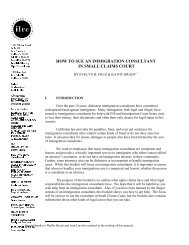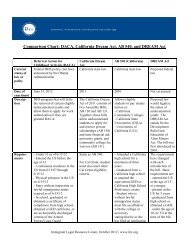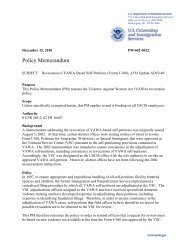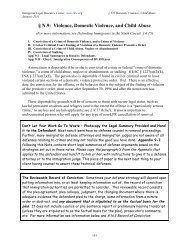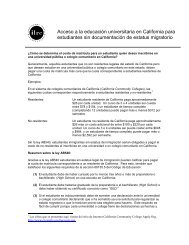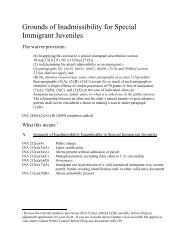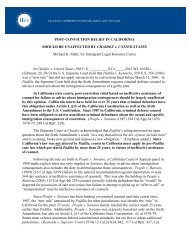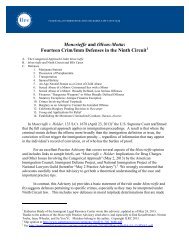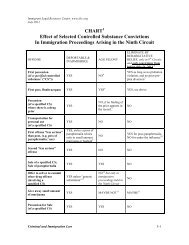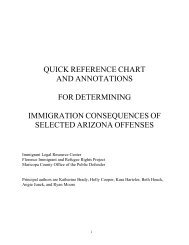quick reference chart and notes for determining immigration - ILRC
quick reference chart and notes for determining immigration - ILRC
quick reference chart and notes for determining immigration - ILRC
Create successful ePaper yourself
Turn your PDF publications into a flip-book with our unique Google optimized e-Paper software.
Cali<strong>for</strong>nia Quick Reference Chart <strong>and</strong> Notes<br />
February 2010<br />
Counsel should assume that P.C. § 272 may be charged as a crime of child abuse,<br />
although this should be fought. Like § 273a(b), the statute does not require that harm occurred,<br />
even to the child’s morals, but rather that the adult acted in a way that could tend to encourage<br />
this. Counsel should plead to this type of action, <strong>and</strong> not to actually causing harm.<br />
5. Conviction of certain offenses against a victim under the age of 18 will act as a bar to a<br />
U.S. citizen or permanent resident being able to file a family visa petition <strong>for</strong> an<br />
immigrant family member.<br />
A U.S. citizen or permanent resident who is convicted of sexual conduct or solicitation,<br />
kidnapping, or false imprisonment where the victim is under age 18 faces a serious penalty: he<br />
or she may be barred from filing a family visa petition to get lawful <strong>immigration</strong> status <strong>for</strong> a<br />
close relative in the future. See further discussion of the Adam Walsh Act at Note 11, infra.<br />
D. Conviction <strong>for</strong> Stalking<br />
Assume Calif. P.C. § 646.9 is a deportable “stalking” offense. A conviction <strong>for</strong> the<br />
undefined term “stalking” triggers deportability if received after admission <strong>and</strong> after September<br />
30, 1996. Defense counsel should conservatively assume that Calif. P.C. § 646.9 is a deportable<br />
offense under this ground.<br />
Section 646.9 as an aggravated felony. A “crime of violence” is an aggravated felony if<br />
a sentence of a year or more has been imposed. To absolutely prevent a conviction under §<br />
646.9 from being classed as an aggravated felony, counsel should obtain a sentence imposed of<br />
364 days or less, <strong>for</strong> any one count. See §N.4 Sentence Solutions.<br />
If that is not possible, counsel still may be able to avoid an aggravated felony by pleading<br />
to “harassing” under § 646.9 with a vague record of conviction, or if this is the only offense that<br />
would cause deportability, by pleading to harassing or following. The Ninth Circuit found that §<br />
646.9 is divisible as a crime of violence. The statute penalizes following or harassing, <strong>and</strong><br />
harassing can be committed, e.g., through the mail from hundreds of miles away, which is not a<br />
crime of violence. 161 If the in<strong>for</strong>mation in the record of conviction shows that the harassing<br />
conduct does come within 18 USC § 16, however, the offense will be held a crime of violence,<br />
<strong>and</strong> will be an aggravated felony if a sentence of at least a year is imposed. (It also will be held a<br />
deportable crime of domestic violence, but since one must assume that any § 646.9 conviction<br />
already would be held a deportable stalking offense, that is not strategically important.)<br />
161 Malta-Espinoza v. Gonzales 478 F.3d 1080, 1083 (9th Cir 2007) (“Harassing can involve conduct of which it is<br />
impossible to say that there is a substantial risk of applying physical <strong>for</strong>ce to the person or property of another, as §<br />
16(b) requires.”) The IJ’s finding below that the offense was deportable as “stalking” under 8 USC § 1227(a)<br />
(2)(E)(i) did not go up on appeal. Id. at 1081. This decision reversed Matter of Malta, 23 I&N Dec. 656 (BIA 2004).<br />
Immigrant Legal Resource Center N-101



